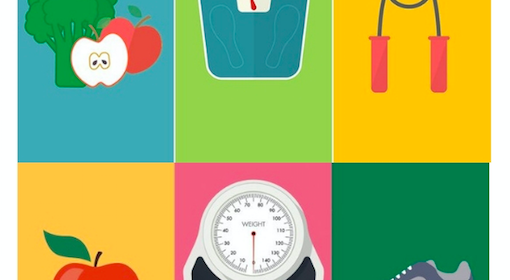
A Failure to Lose. How we think, feel, and diet (and then eat some more) on our weight loss journey…
 The United States has the highest levels of obesity and weight issues in the world, with nearly two-thirds of adults and 17% of children overweight or obese. In this ongoing blog series, I’m going to bring you all of the stats, facts, information, and support you need to lose weight and live a healthier, more active lifestyle.
The United States has the highest levels of obesity and weight issues in the world, with nearly two-thirds of adults and 17% of children overweight or obese. In this ongoing blog series, I’m going to bring you all of the stats, facts, information, and support you need to lose weight and live a healthier, more active lifestyle.Today, let’s cover how we think, feel, and diet (and then eat some more) on our weight loss journey.
According to the Centers for Disease Control and Prevention’s National Center for Health Statistics (NCHS), about 49% of all U.S. adults are actively trying to lose weight (within the last twelve months). That comes out to four out of every ten of the nation’s 125.9 million adults, or 62.9 million people hoping to shed pounds.
However, of those 63 million adults who are dieting, working out more, and trying just about everything else to lose weight, only 29% – or, less than three out of ten – are confident that they’ll be able to do so.
Additionally, about two-thirds of obese adults are trying to lose weight, half of all overweight adults are efforting to weigh, less, and more women (56.4%) than men (41.7%) have a goal of losing lbs.
If you believe you can’t…
Our own mindset about losing weight might be one of the biggest impediments to actually doing so.
That’s because a reported 70% of Americans surveyed don’t believe that they can even achieve their weight loss goals.
Not surprisingly, the majority of U.S. adults (about 62%) say that losing weight is even harder these days than it was for generations past, in large part because of our time spent on screens, tech, and gadgets, as well as our busier, sedentary lifestyles.
Even healthcare professional (like chiropractors, medical doctors, and pharmacists) agree with that notion, as about seven out of ten agree that it’s harder for Americans to lose weight and keep it off these days.
 Why is it so hard to lose weight?
Why is it so hard to lose weight?According to a national survey by the Calorie Control Council, here are the most prevalent reasons why respondents said they are still overweight, despite efforts to diet:
69% Don’t get enough exercise
62% Think their metabolism is slowing down
52% Eat too much snack food
50% Lack the self-discipline
49% Overindulge in their favorite foods
41% Eat for emotional reasons
38% Overeat during meals
33% Trouble eating healthy at restaurants
Keeping the weight off.
Of course, much of the focus is on losing weight, but maintaining that weight loss has proven to be just as difficult.
In fact, researchers at the Penn State College of Medicine carefully tracked data from the National Health and Nutrition Examination Survey through the years 1999 to 2006, identifying people who were able to lose thirty pounds and then keep it off for at least one year.
They found that 36% of the subjects maintained a weight loss of at least 5% of their initial body weight. When it came to losing at least 10% of their initial body weight and keeping it off, women did a far better job than men. Interestingly, when a subject was married or had a partner, they were far less likely to keep the weight off.
In summary, they found that only about one in every six people in the study – or just shy of 17% – who started as overweight or obese were able to lose the weight and maintain that weight loss.
Weighed down by frustration.
With approximately two-thirds of all U.S. adults overweight or obese, we seem to be in a perpetual “cycle of weight-loss failure & frustration” as Time Magazine put it.
About six out of every ten people polled (59%) reported feeling frustrated by their repeated attempts to lose weight. Those same weight loss wishers tried, on average, five times to lose weight over the past five years. (Sounds like a New Year’s Resolution gone awry?)
A survey of healthcare professionals concurs with those findings, although they estimate that only about 12% (one in eight) of their patients are able to successfully lose weight and then keep it off longterm.
In fact, they point out that dieting actually leads to weight gain in many of their patients!
Top weight loss methods.
According to researchers, the top methods of losing weight include exercising more (63%) and eating less (63%).
About 33% of people aspiring to lose weight follow a specific diet, with intermittent fasting now the most popular weight loss diet.
Other popular diet plans include low-carb diets, like the Paleo diet, Whole30, high-protein eating plans, and the ketogenic diet.
Most people also pointed to eating more fruits and vegetables, reducing their intake of fast food, sugary foods, and fast foods, and drinking more water as ways to lose weight.
Lifestyle factors and weight loss.
Our modern lifestyle may be one of the main obstacles to losing weight, according to various reports and surveys.
In fact, about 95% of healthcare professionals and 88% of U.S. adults say that our “on-demand and screen-focused way of life” is causing us to be less physically active than ever. Furthermore, modern conveniences like meal delivery apps, ridesharing with Uber, etc., online shopping, and our sedentary work habits (i.e., sitting at a desk all day long) are making it harder and harder to lose weight and stay fit.
Increasingly, our lack of time is causing us not only to fail to carve out time for exercise and miss the gym, but put less planning and care into our meal preparation, resulting in fast food, junk food, an abundance of unhealthy, processed food, binge eating, or eating less fresh produce.
Nearly nine out of ten Americans polled (89%) believe that Americans need to take a new approach to weight loss that fits with today’s modern lifestyle.
The #1 thing that’s holding us back from weight loss my surprise you.
However, healthcare professionals point to one other factor that may be holding us back from the weight loss we desire more than any other, and that’s the lack of a weight loss plan. In fact, 89% of these health professionals cite the lack of a plan as a deterrent to weight loss.
They also stress the importance of a weight loss plan that’s:
1. Sustainable (79%)
2. Not overly time consuming (56%)
3. Not requiring sudden or major shifts to a person’s daily routine (54%)
4. And that works quickly and safely (42%)
Consult with a healthcare professional.
These days, people go just about everywhere for their advice, planning, and support about diets and weight loss, including online, friends and family, and even government agencies.
However, they still do not consult with a healthcare professional about their weight loss plan on a regular basis (only 32% of U.S. adults do so).
If you’d like to start losing weight – keep it off – and live a healthier life, please contact me to make an appointment. I’d love to offer my professional help and turn you into a success story!
Leave a reply 


nice website for GYm
ReplyThanks a lot for sharing this amazing blog with us. Such amazing article keep sharing.
team <a href=http://keepyoursoulhealthy.com">keeyoursoulhealthy</a>
ReplyThanks a lot for sharing this amazing blog with us. Such amazing article keep sharing.
team <a href=http://keepyoursoulhealthy.com>keeyoursoulhealthy</a>
ReplyReduce weight loss is not the answer to every health problem, but if your doctor recommends it, there are tips to help you lose weight safely. A steady weight loss of 1 to 2 pounds per week is recommended for the most effective long-term weight management.
ReplyThank you for your information about health. This is very important for me and I’m very interested in your information.
<a href=" https://thenewsshed.com/">Keyword<a/>
Reply